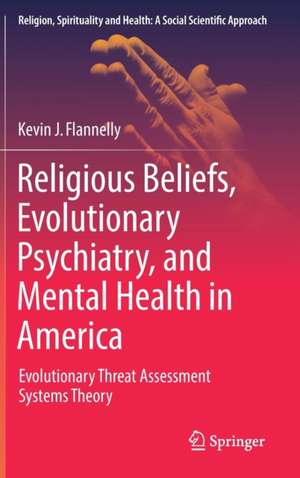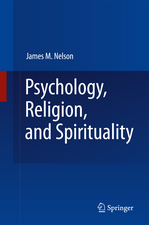Religious Beliefs, Evolutionary Psychiatry, and Mental Health in America: Evolutionary Threat Assessment Systems Theory: Religion, Spirituality and Health: A Social Scientific Approach, cartea 1
Autor Kevin J. Flannellyen Limba Engleză Hardback – 25 apr 2017
| Toate formatele și edițiile | Preț | Express |
|---|---|---|
| Paperback (1) | 699.93 lei 6-8 săpt. | |
| Springer International Publishing – 21 iul 2018 | 699.93 lei 6-8 săpt. | |
| Hardback (1) | 706.30 lei 6-8 săpt. | |
| Springer International Publishing – 25 apr 2017 | 706.30 lei 6-8 săpt. |
Preț: 706.30 lei
Preț vechi: 830.95 lei
-15% Nou
Puncte Express: 1059
Preț estimativ în valută:
135.17€ • 146.77$ • 113.54£
135.17€ • 146.77$ • 113.54£
Carte tipărită la comandă
Livrare economică 22 aprilie-06 mai
Preluare comenzi: 021 569.72.76
Specificații
ISBN-13: 9783319524870
ISBN-10: 3319524879
Pagini: 327
Ilustrații: XV, 341 p. 55 illus.
Dimensiuni: 155 x 235 x 21 mm
Greutate: 0.68 kg
Ediția:1st ed. 2017
Editura: Springer International Publishing
Colecția Springer
Seria Religion, Spirituality and Health: A Social Scientific Approach
Locul publicării:Cham, Switzerland
ISBN-10: 3319524879
Pagini: 327
Ilustrații: XV, 341 p. 55 illus.
Dimensiuni: 155 x 235 x 21 mm
Greutate: 0.68 kg
Ediția:1st ed. 2017
Editura: Springer International Publishing
Colecția Springer
Seria Religion, Spirituality and Health: A Social Scientific Approach
Locul publicării:Cham, Switzerland
Cuprins
Part I: The Origin of Evolutionary Ideas in Historical and Religious Context.- Chapter 1. Greek Philosophy, Early Christian Theology, Purpose, and Change.- Chapter 2. The Reformation and The Enlightenment.- Chapter 3. 19th Century Evolutionary Thought before Charles Darwin.- Part II: Charles Darwin’s Theories of Evolution and Reactions to Them.- Chapter 4. Charles Darwin’s Origin of Species.- Chapter 5. Reactions to the Darwin’s Origin of Species.- Chapter 6. Darwin’s Descent of Man and The Expression of Emotions.- Chapter 7. Reactions to The Expression of Emotions.- Part III: Evolutionary Psychiatry.- Chapter 8. Brain Evolution and Emotions.- Chapter 9. Fear in the Animal and Human Brain.- Chapter 10. Anxiety Disorders as Evolutionary Adaptations.- Chapter 11. Other Psychiatric Disorders as Evolutionary Adaptations.- Chapter 12. Beliefs and Psychiatric Symptoms.- Chapter 13. Evolutionary Threat Assessment Systems Theory.- Part IV: Religious Beliefs and Mental Health.- Chapter 14. Belief in God and Life-After-Death among American Adults.- Chapter 15. Religion and Death Anxiety.- Chapter 16. Belief in Life-after-Death and Mental Health.- Chapter 17. Beliefs about Life-after-Death and Psychiatric Symptoms.- Chapter 18. Beliefs about the Nature of God and Mental Health.- Chapter 19. Beliefs about One’s Relationship with God and Mental Health.- Chapter 20. Belief in God as an Attachment and Mental Health.- Chapter 21. Belief in Meaning in Life and Mental Health.- Chapter 22. Religious Doubt and Mental Health.- Chapter 23. Belief in Divine Forgiveness, Evil, and Biblical Literalism and Mental Health.- Part V: Summary, Conclusions, and Recommendations for Future Research Research.- Chapter 24. Theories of Organic Evolution in Historic and Modern Perspective.- Chapter 25. Evolutionary Psychiatry and ETAS Theory.- Chapter 26. Past, Present, and Future Research on Religious Beliefs and Mental Health.
Recenzii
“Religious Beliefs, Evolutionary Psychiatry, and Mental Health in America is both timely and overdue. … the book offers researchers a well-scripted path for advancing the study of religious beliefs and mental health as well as investigating the biological and psychological mechanisms that may underly these relationships.” (Andrea k. Henderson, Journal for the Scientific Study of Religion, Vol. 57 (03), 2018)
Notă biografică
Dr. Kevin J. Flannelly received his Ph.D. in physiological and comparative psychology from the University of Hawaii at Manoa and his M.S. in psychobiology from Rutgers University. He has conducted research on a wide range of topics in sociology, psychiatry, and psychopharmacology, and clinical, cognitive, comparative, developmental, and physiological psychology, as well as various areas of healthcare. Over the past 40 years, he has published more than 160 peer-reviewed articles and numerous other articles and book chapters. He became interested in the relationship between religion and physical and mental health in 1995, and he has published almost 90 peer-reviewed articles in the field of religion and health. Dr. Flannelly published his first study exploring the connection between religious beliefs and mental health in 2004 and he published his first theoretical model about the mechanisms by which beliefs affect mental health in a 2006 article in The Journal of Nervous and MentalDisease, titled “Beliefs, Mental Health, and Evolutionary Threat Assessment Systems in the Brain.” In all, he has published a score of empirical and theoretical articles on the relationship between religious beliefs and mental health.
Textul de pe ultima copertă
This book provides a new perspective on the association between religious beliefs and mental health. The book is divided into five parts, the first of which traces the development of theories of organic evolution in the cultural and religious context before Charles Darwin. Part II describes the major evolutionary theories that Darwin proposed in his three books on evolution, and the religious, sociological, and scientific reactions to his theories. Part III introduces the reader to the concept of evolutionary psychiatry. It discusses how different regions of the brain evolved over time, and explains that certain brain regions evolved to protect us from danger by assessing threats of harm in the environment, including other humans. Specifically, this part describes: how psychiatric symptoms that are commonly experienced by normal individuals during their everyday lives are the product of brain mechanisms that evolved to protect us from harm; the prevalence rate of psychiatric symptoms in the U.S. general population; how religious and other beliefs influence the brain mechanisms that underlie psychiatric symptoms; and the brain regions that are involved in different psychiatric disorders. Part IV presents the findings of U.S. studies demonstrating that positive beliefs about God and life-after-death, and belief in meaning-in-life and divine forgiveness have salutary associations with mental health, whereas negative beliefs about God and life-after-death, belief in the Devil and human evil, and doubts about one’s religious beliefs have pernicious associations with mental health. The last part of the book summarizes each section and recommends research on the brain mechanism underlying psychiatric symptoms, and the relationships among these brain mechanisms, religious beliefs, and mental health in the context of ETAS Theory.
Caracteristici
Is the first book to explain how religious beliefs affect the mental health of ordinary people Is unique in tracing the evolutionary origins of psychiatric symptoms Includes simple schematic drawings of the brain, and extensive graphs illustrating research findings on religious beliefs and mental health















